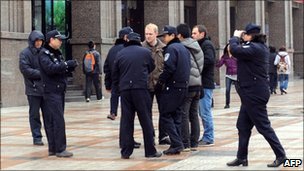- Joined
- Apr 5, 2009
- Messages
- 11,615
- Likes
- 5,772
Why Is China Harassing Reporters?
Posted by Evan Osnos
For foreign journalists trying to decode China's closed-door discussions about democratic movements in the Middle East, the government has made it unusually easy. The current mix of threats and force directed at domestic gadflies, and now reporters in Beijing and Shanghai—as catalogued by the Times today—has done far more to dramatize China's concerns about unrest than any of the faceless online efforts to organize "strolls" and other protests. Of the two colleagues I dined with last night in Beijing, one had been summoned to the police station to be advised that he had "broken reporting rules," while the other ticked off the names of his colleagues who have received uninvited home-visits by public-security officials. As he pointed out, the great irony of the whole episode is that, of all the various commentators around the world scanning for signs of a jasmine contagion, foreign reporters in Beijing have been some of the first to point out why China is an unlikely candidate. (The differences, briefly: economic health, political history, technological infrastructure. I've discussed it a couple of times.)
First, some perspective: none of this harassment compares to the fate befalling China's own activists.
China's foreign minister said today that there is "no such issue as Chinese police officers beating foreign journalists," a statement that doesn't look good next to this video of a BBC reporter and cameraman being manhandled.
So, what gives? Why does a country usually so sensitive about its image—so quick to mention when other countries have "hurt the feelings of the Chinese people"—go after the people with the cameras? Because domestic security trumps all. Chinese authorities have concluded in recent years that any kind of bad press or damaged diplomatic ties can be repaired with time—while domestic stability, as they perceive it, cannot.
But this kind of old-fashioned bullying does more than just undo China's worthwhile efforts to project a friendly international image. The differences between China and Egypt are meaningful, but they seem less significant every time someone gets a knock at the door. Chasing down journalists is a classic tell, the facial tic of a system under pressure.
Posted by Evan Osnos
For foreign journalists trying to decode China's closed-door discussions about democratic movements in the Middle East, the government has made it unusually easy. The current mix of threats and force directed at domestic gadflies, and now reporters in Beijing and Shanghai—as catalogued by the Times today—has done far more to dramatize China's concerns about unrest than any of the faceless online efforts to organize "strolls" and other protests. Of the two colleagues I dined with last night in Beijing, one had been summoned to the police station to be advised that he had "broken reporting rules," while the other ticked off the names of his colleagues who have received uninvited home-visits by public-security officials. As he pointed out, the great irony of the whole episode is that, of all the various commentators around the world scanning for signs of a jasmine contagion, foreign reporters in Beijing have been some of the first to point out why China is an unlikely candidate. (The differences, briefly: economic health, political history, technological infrastructure. I've discussed it a couple of times.)
First, some perspective: none of this harassment compares to the fate befalling China's own activists.
China's foreign minister said today that there is "no such issue as Chinese police officers beating foreign journalists," a statement that doesn't look good next to this video of a BBC reporter and cameraman being manhandled.
So, what gives? Why does a country usually so sensitive about its image—so quick to mention when other countries have "hurt the feelings of the Chinese people"—go after the people with the cameras? Because domestic security trumps all. Chinese authorities have concluded in recent years that any kind of bad press or damaged diplomatic ties can be repaired with time—while domestic stability, as they perceive it, cannot.
But this kind of old-fashioned bullying does more than just undo China's worthwhile efforts to project a friendly international image. The differences between China and Egypt are meaningful, but they seem less significant every time someone gets a knock at the door. Chasing down journalists is a classic tell, the facial tic of a system under pressure.



